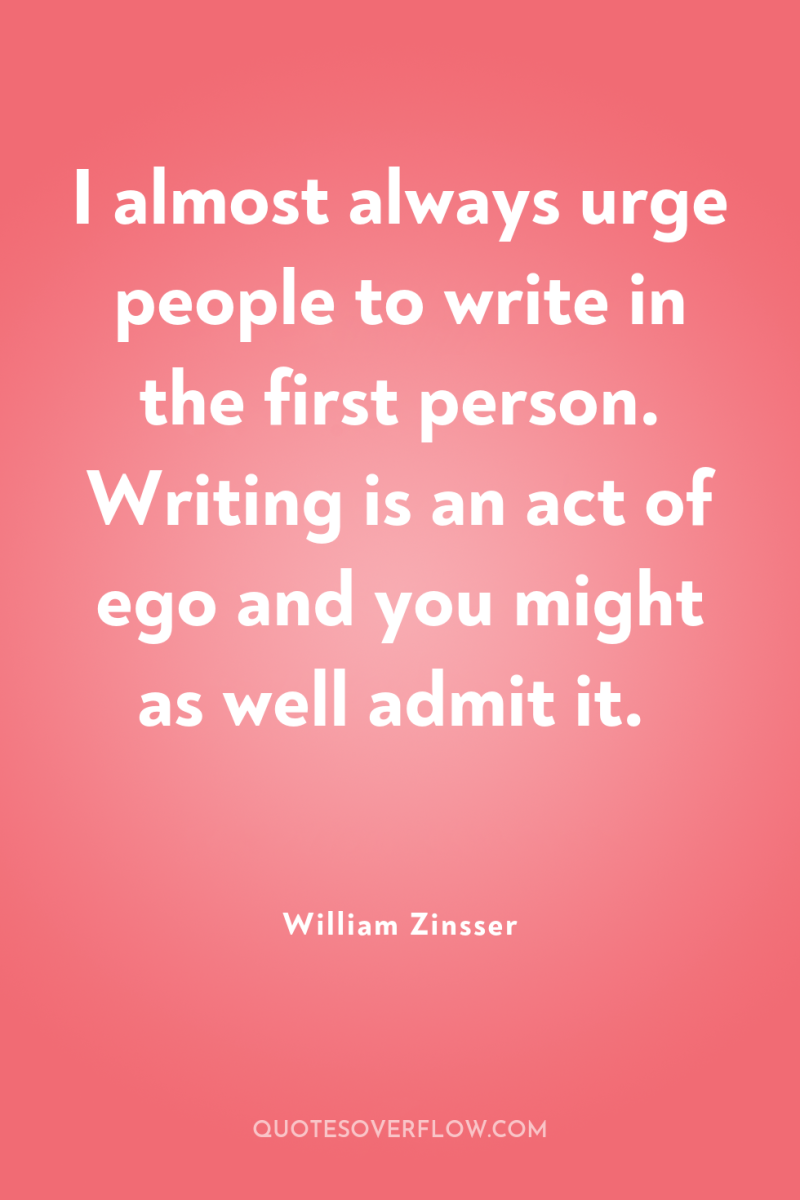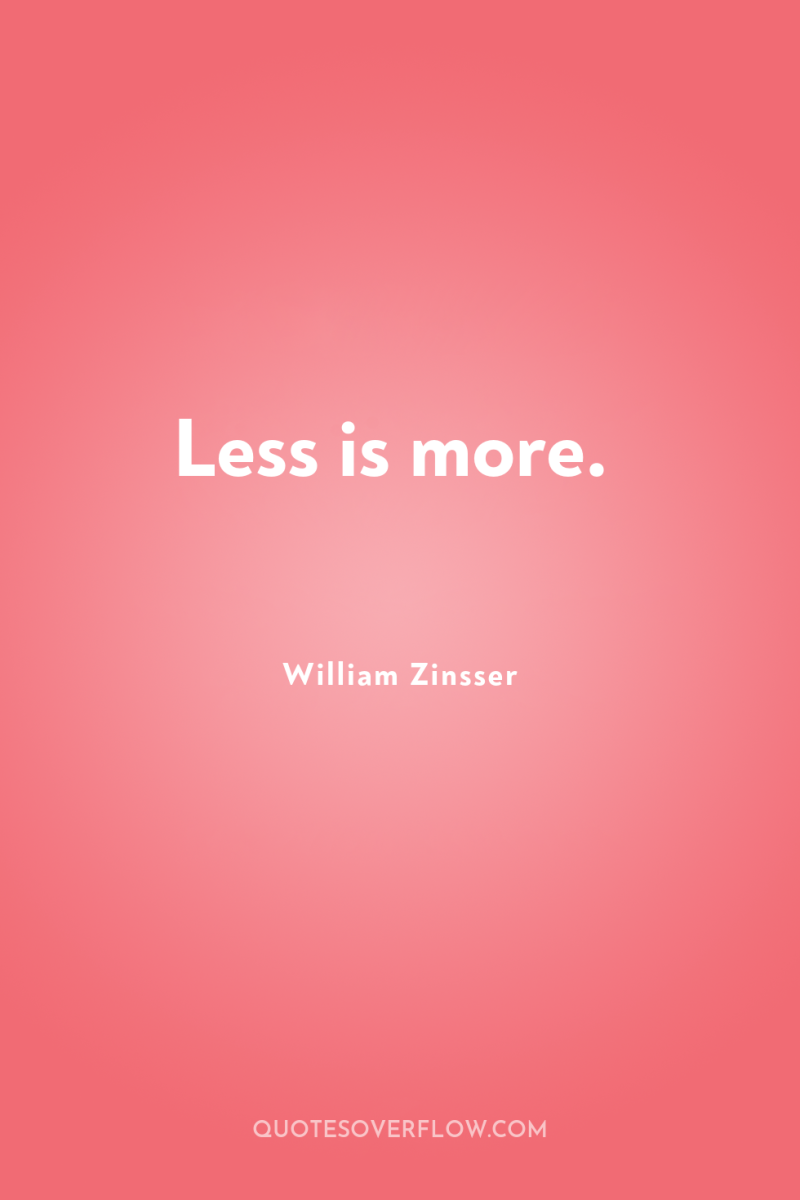1
Don’t try to visualize the great mass audience. There is no such audience–every reader is a different person.William Zinsser
2
Write about small, self-contained incidents that are still vivid in your memory. If you remember them, it's because they contain a larger truth that your readers will recognize in their own lives. Think small and you'll wind up finding the big themes in your family saga.William Zinsser

3
I almost always urge people to write in the first person. Writing is an act of ego and you might as well admit it.William Zinsser

4
Less is more.William Zinsser
5
There are some writers who sweep us along so strongly in their current of energy-- Normal mailer, Tom Wolfe, Toni Morrison, William F. Buckley, Jr., Hunter Thompson, David Foster Wallace, Dave Eggers--that we assume that when they go to work the words just flow. Nobody thinks of the effort they made every morning to turn on the switch. You also have to turn on the switch. Nobody is going to do it for you.William Zinsser
6
Vulnerability has a strength of its own.William Zinsser
7
Not everybody has a talent for painting, or for the piano, or for dance. But we can write our way into the artist's head and into his problems and solutions. Or we can go there with another writer.William Zinsser
8
Good writing has an aliveness that keeps the reader reading from one paragraph to the next, and it's not a question of gimmicks to "personalize" the author. It's a question of using the English language in a way that will achieve the greatest clarity and strength.William Zinsser
9
Writing is such a lonely work that I try to keep myself cheered up.William Zinsser
10
I'm often dismayed by the sludge I see appearing on my screen if I approach writing as a task--the day's work--and not with some enjoyment.William Zinsser
11
The writer, his eye on the finish line, never gave enough thought to how to run the race.William Zinsser
12
The final advantage is the same that applies in every other competitive venture. If you would like to write better than everyone else, you have to want to write better than everyone else. You must take an obsessive pride in the smallest details of your craft. And you must be willing to defend what you've written against the various middlemen--editors, agents, and publishers--whose sights may be different from yours, whose standards are not as high. Too many writers are browbeaten into settling for less than their best.William Zinsser
13
Don't annoy your readers by over-explaining--by telling them something they already know or can figure out. Try not to use words like "surprisingly, " "predictably" and "of course, " which put a value on a fact before the reader encounters the fact. Trust your material.William Zinsser
14
Good writing is good writing, whatever form it takes and whatever we call it.William Zinsser
15
...being "rather unique" is no more possible than being rather pregnant.William Zinsser
16
Most writers sow adjectives almost unconsciously into the soil of their prose to make it more lush and pretty, and the sentences become longer and longer as they fill up with stately elms and frisky kittens and hard-bitten detectives and sleepy lagoons. This is adjective-by-habit - a habit you should get rid of. Not every oak has to be gnarled. The adjective that exists solely as a decoration is a self-indulgence for the writer and a burden for the reader. .William Zinsser
17
Most writers sow adjectives almost unconsciously into the soil of their prose to make it more lush and pretty, and the sentences become longer and longer as they fill up with stately elms and frisky kittens and hard-bitten detectives and sleepy lagoons. This is adjective-by-habit - a habit you should get rid of. Not every oak has to be gnarled. The adjective exists solely as a decoration is a self-indulgence for the writer and a burden for the reader. .William Zinsser
18
Mind in language are inseparable. If we violate our language we violate ourselves.William Zinsser
19
Even a poor translator couldn't kill a style that moves with such narrative clarity.William Zinsser
20
Writers who think THEY are being criticized when only that writing is being criticized are beyond a teacher's reach. Writing can only be learned when a writer coldly separates himself from what he has written and looks at it with the objectivity of a plumber examining a newly piped bathroom to see if he got all the joints tight.William Zinsser
21
If a philosophical writer cannot be followed, the difficulty of his subject can be placed only in mitigation of his offense, not in condonation of it. There are too many expert witnesses on the other side.William Zinsser
22
But on the question of who you're writing for, don't be eager to please.William Zinsser
23
Learn to enjoy this tidying process. I don't like to write; I like to have written. But I love to rewrite. I especially like to cut: to press the DELETE key and see an unnecessary word or phrase or sentence vanish into the electricity. I like to replace a humdrum word with one that has more precision or color. I like to strengthen the transition between one sentence and another. I like to rephrase a drab sentence to give it a more pleasing rhythm or a more graceful musical line. With every small refinement I feel that I'm coming nearer to where I would like to arrive, and when I finally get there I know it was the rewriting, not the writing, that wont the game.William Zinsser
24
But apart from these lazinesses of logic, what makes the story so tired is the failure of the writer to reach for anything but the nearest cliche'. "Shouldered his way, " "only to be met, " "crashing into his face, " "waging a lonely war, " "corruption that is rife, " "sending shock waves, " "New York's finest, " - these dreary phrases constitute writing at its most banal. We know just what to expect. No surprise awaits us in the form of an unusual word, an oblique look. We are in the hands of a hack, and we know it right away, We stop reading.William Zinsser
25
It wont do to say that the reader is too dumb or too lazy to keep pace with the train of thought. If the reader is lost, it's usually because the writer hasn't be careful enough.William Zinsser
26
It wont do to say that the reader is too dumb or too lazy to keep pace with the train of thought. If the reader is lost, it's usually because the writer hasn't been careful enoughWilliam Zinsser
27
Beware, then, of the long word that's no better than the short word: "assistance" (help), "numerous" (many), "facilitate" (ease), "Individual" (man or woman), "remainder" (rest), "initial" (first), "implement" (do), "sufficient" (enough), "attempt" (try), "referred to as" (called), and hundreds more. Beware of all the slippery new fad words: paradigm and parameter, prioritize and potentialize. They are all weeds that will smother what you write. Don't dialogue with someone you can talk to. Don't interface with anybody.William Zinsser
28
One of underestimated tasks in nonfiction writing is to impose narrative shape on an unwieldy mass of material.William Zinsser
29
Probably every subject is interesting if an avenue into it can be found that has humanity and that an ordinary person can follow.William Zinsser
30
Writing can be taught or learned in the vacuum. We must say to students in every area of knowledge: "This is a how other people have written about this subject. Read it; study it; think about it. You can do it too.William Zinsser
31
It's no fun to think about infinity and no cinche to write about it. Again, it helps to look for some human link.William Zinsser
32
I never think of him as a scholar assaulting me with how much he knows, but as a teacher eager to share a lifelong passion for the subject.William Zinsser
33
Editors are licensed to be curious.William Zinsser
34
But the secret of good writing is to strip every sentence to its cleanest components. Every word that serves no function, every long words that could be a short word, every adverb that carries the same meaning that's already in the verb. every passive construction that leaves the reader unsure of who is doing what-these are the thousand and one adulterants that weaken the strength of a sentence. And they usually occur in proportion to education and rank. .William Zinsser
35
Was the whole matter of aptitudes a myth — a copout used by people like me to avoid subjects that would force us to think in Therefore threatening ways?William Zinsser
36
The reader is someone with an attention span of about 30 seconds.William Zinsser
37
Look for the clutter in your writing and prune it ruthlessly. Be grateful for everything you can throw away. Reexamine each sentence you put on paper. Is every word doing new work? Can any thought be expressed with more economy? Is anything pompous or pretentious or faddish? Are you hanging on to something useless just because you think it's beautiful?... Simplify, simplify.William Zinsser